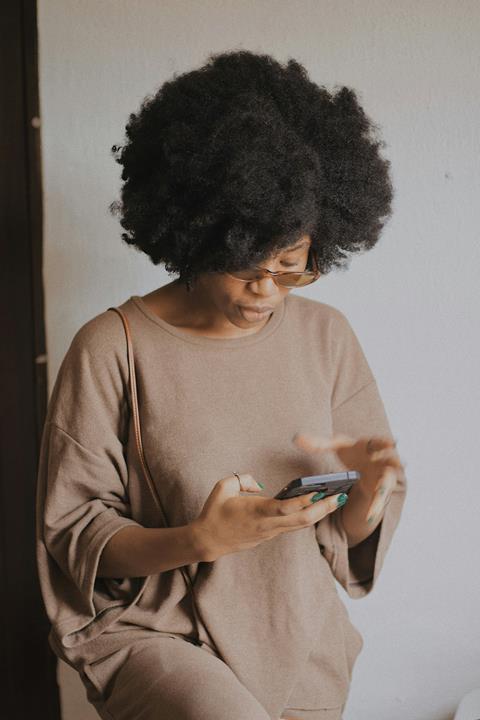Woman Alive deputy editor, Jemimah Wright explores the rise of two viral dating apps, Tea and TeaOnHer, which promise to protect users by sharing information about potential partners.

In July and early August 2025, two apps stormed the iPhone App Store: Tea, followed swiftly by its gender-flipped counterpart TeaOnHer. Both claim to help users share information on potential dating partners, but their swift rise and troubling flaws spotlight a tense intersection between safety, ethics, and grace.
Launched in 2023 by Sean Cook, Tea Dating Advice is marketed as a women-only safety tool. By mid-2025, it had accrued over 4 million users and reached the top charts in the App Store.
The website, www.teaforwomen.com, says the aim of the app is to help women run background checks, identify potential catfish, verify he is not a sex-offender, and check for a criminal history.
READ MORE: Dating apps not working for you? Here’s why you might be getting the matches but not the marriage
But the app’s promise of empowerment unravelled quickly.
But the app’s promise of empowerment unravelled quickly. In July 2025, a breach exposed around 72,000 selfies and ID photos as well as over 1 million private messages, throwing its mission into sharp contrast with catastrophic privacy failures. Despite these issues, many women found the app a vital resource, part of a whisper-network logic that many had long relied on offline.
As of writing the app is not availalble, @theteapartygirls instagram page mentions the recent cyber attack, and said ‘we have taken the affected system offline.’
However, in it’s short life span, the app seems to have done some good. Although not verified as true, you can watch some testimonies from those using the app on Instagram account @theteapartygirls. One woman speaks of going out to dinner alone, a guy comes up to ask if he can sit with her, and they talk, for nearly two hours. On her way home, the girl calls her best friend to tell her what just happened. Half way into the story, the friend asks for the guy’s number so she can put it through the app. What comes up is that he has a kidnapping charge on his record. She said the app saved her. Sounds like it did. Advertising later states, ‘It isn’t just an app, its protection.’
READ MORE: These are the apps that should be on every Christian woman’s smart phone
Not long after Tea was released, came TeaOnHer, ostensibly flipping the script: men could report experiences with women, marking safety concerns or positive experiences. It too climbed the charts, ranking as high as No. 2 in Lifestyle on iOS, with over 53,000 users at launch.
However, TeaOnHer’s security posture mirrored its predecessor’s. Reports revealed vulnerabilities exposing IDs, selfies, emails, and even the admin’s credentials; worse, guest users reportedly saw explicit images of women, raising alarming consent and privacy concerns.
Even though the two apps are currently offline, there are apparently many ‘Are we dating the same guy’ (AWDTSG) facebook pages that do a similar thing, The apps captured the zeitgeist, offering a semblance of safety amid online dating’s risks, but also illustrate the tension between vigilance and vulnerability.
From a Christian standpoint, seeking safety is not only understandable—it’s wise.
From a Christian standpoint, seeking safety is not only understandable, it’s wise. Scripture speaks of the prudent person who scouts ahead (Proverbs 27:12). Women (and men) have long relied on community networks to protect themselves. These apps, in theory, digitize that same instinct: “to be forewarned is to be forearmed.”
Yet Christianity also calls us to extend grace and forgiveness.What if they do have a prison record? Would it not be better to speak about in person? If someone has wronged us, vengeance belongs to God (Romans 12:19). Publicly branding someone for their worst moment, and consigning them to lifelong suspicion, may deny the possibility of repentance, restoration, and change.
Recently the founder of one of the AWDTSG accounts said she regretted making the page. She said: ’I think this group could be helpful if there were actually abusive, bad or cheating men being posted. However, it has turned into posting about every single little flaw one can find in a guy, being shared to thousands of women. The ironic thing is, when an abusive man actually does get posted, the post gets much less traction and some women even come to the man’s defense. Yet, when it’s something less significant, like the guy talked about himself too much, all of a sudden, there’s hundreds of comments bashing the guy’s looks and everything about him.’
READ MORE: These are the dating apps and sites where you can find Christians
Would you post news about your boyfriend’s mistake? In the heat of heartbreak, our wounds may scream for exposure, but Christian love invites reflection. Could we instead confront him directly? Digital shaming risks becoming a cycle of anger-primal rather than restorative. Indeed, these apps may heighten distrust, reflecting a culture where distrust of strangers on Tinder or Hinge (“they may be talking about you”) becomes normalized. But is safety best served via anonymous posts? Or through honest conversations, trusted friendships, and seeking discernment combined with empathy?
The boom of Tea and TeaOnHer speaks to a dating culture fraught with fear, misinformation, and digital vulnerability. While they aim to provide safety, their breaches reveal that technology alone cannot shield us, and may even harm well-intentioned users.
From a Christian worldview, a balanced posture matters. We can, and should, be discerning. We can be cautious, but not cynical. We can protect, but still extend grace and build healthy relational norms.
In a world where swipes and whispers blur together, may we choose wisdom rooted in compassion over convenience, and mercy over the urge to judge. After all, to love well is to walk the delicate line between caution and restoration.




































No comments yet